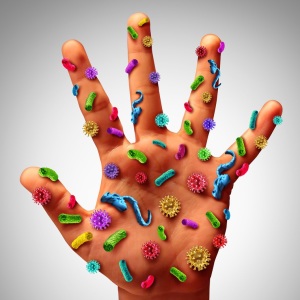Despite the best efforts of people like my middle school Biology teacher who tried to teach us otherwise, most of us have been raised to be alarmed by the “alien life” of bacteria teeming in our eyelashes and hair, on the surface of our skin, in our mouths and even in our digestive tracts.
Let’s face it, this microscopic alien world seems creepy.
And with the prevalence of anti-bacterial soaps and the widespread, sometimes cavalier distribution of antibiotics, germophobes everywhere are enjoying what they believe to be a cleaner and healthier environment than ever before.
But, perhaps counter-intuitively, the opposite is true. Bacteria is beneficial for human health.
Here are 5 reasons why microbial health is becoming the hottest topic in human health.
1. The Microbiome: A “Newly Discovered” Organ
It can be surprising to learn how many microbes inhabit a typical person. It is estimated that there are ten times as many microbial cells as “mammalian” cells in the human body, weighing about six pounds in an average adult. With trillions of them enjoying the comfort of our bodies and the food that we provide, it seems only fair that they should return the favor and give us assistance in return.
Scientists are starting to learn more about the role that these cohabitating microbes (probiotic bacteria and fungi) have on promoting health the benefits they provide. They support human health in many extremely important ways – a true symbiotic relationship – such as by aiding digestion, synthesizing vitamins that we otherwise cannot, training and supporting the immune system and promoting mental health, and many other benefits.
The individual mix of microbes that live in each of us is known as our microbiome. Some doctors even consider the microbiome as a newly discovered human organ, which supports health when functioning well, but causes disease when disturbed. Studying the ways that the microbiome interacts with the human body is perhaps one of the hottest fields in medical research right now. Exciting findings are coming out about our microbiome all of the time.
2. Microbiome Health is Connected to Obesity
Do you know why industrial farmers feed low levels of antibiotics to their cattle and chickens? Yes, it does reduce the spread of infectious disease, but that’s not why they do it. The primary reason for administering antibiotics to livestock is that antibiotics promote weight gain in the animals by altering the composition of microbes in the gut. Farm animals that get antibiotics simply fatten more quickly than the rest.
When food enters the digestive tract, the microbes living in our guts actually eat before we, their human hosts, do. Over time, they have developed the ability to influence weight, metabolism and food cravings for their own benefit.
Different microbes thrive on different kinds of diets. Some prefer fiber while others grow best on fat. Yeasts crave sugars and starches. In a finding right out of a science fiction novel, researchers have shown that our dominant resident microbes can affect what kinds of food our brain tells us we want. Our bacteria influence us to crave types of food that make them grow best. Since the mix of microbes in a microbiome is individual to each of us, what influence it has on appetite and cravings differs from person to person.
The microbiome also affects which nutrients are digested from food, how much energy (calories) is obtained from food and even influence metabolism. Some bacteria are more efficient in extracting energy from food than others. Others can influence how much fat is accumulated in our body. Having a gut microbiome heavy in microbes that are very good at obtaining calories from food and storing it as fat can make it easier to gain weight.
Other microbes promote thinness. Christensenellaceae is one bacteria family that has been shown to be significantly more abundant in the digestive tracts of lean people than in obese individuals. When it was transplanted into the guts of germ-free mice, those that received it gained less weight than those that didn’t, even when the mice were raised under identical conditions. Maybe one day instead of gastric bypass surgery, morbidly obese individuals can instead have thinness-promoting microbes transplanted into their digestive tracts.
Perhaps these microbial influences are the truth behind the complaint that some dieters make that they eat no more than their slender friends, but somehow seem to gain more weight.
Some experts believe that a connection exists between a disordered gut microbiome and poor appetite and/or unhealthy food cravings. Hence certain kinds of microbes may be triggering the picky-eating epidemic we are observing in children in the developed world. A microbiome heavy in yeasts and other unhealthy gut bugs may cause a child to crave only processed starches and sugars while eschewing fruits, vegetables and whole grains.
Fortunately, we can alter the mix of microbes in our microbiome by changing our diet. Doing this may affect how efficiently the calories are extracted from our foods, change rates of fat storage and even influence which foods we want to eat. Modifying the types of foods one eats can change the microbiome even within a few days.
Although we don’t yet know with any degree of specificity which foods are best for fighting obesity, eating a diet high in prebiotics, which are foods favored by beneficial bacteria, such as whole grains, high-fiber vegetables and fruits, and fermented food, will promote the pre-existing healthy microbes to thrive and multiply. Lowering the intake of starches, sugars and fats will make conditions less favorable for those microbes that thrive on them, thus improving the mix of microbes to support weight control.
There is an amazing correlation between obesity rates and rates of antibiotic administration in the US, as covered here. The authors are careful not to suggest that there is causality, but the correlations are striking, and thought-provoking.
3. Microbial Health Affects Mood, Depression, Anxiety and even Behaviors
The gut bugs in our microbiome can affect behavior and mood. Perhaps those who coined the expression “gut feeling” were actually on to something! Research in this area suggests disturbances in the gut microbiome (dysbiosis) can be the cause, in some patients, of anxiety, depression, schizophrenia and even autistic behaviors.
The vagus nerve, which links 100 million nerve cells in the gut to the brain, enables the microbes inhabiting the digestive to profoundly influence the brain, affecting behavior, mood and emotion, appetite, sense of taste and feelings of fullness. This is what is often referred to as the “Brain Gut Connection.”
The brain gut connection enables our microbiome to influence our emotions and behavior through its ability to both produce neurochemicals and modulate the immune system. Gut bacteria produce and react to the some of the same neurochemicals (including GABA, serotonin, norepinephrine, dopamine, acetylcholine and melatonin) that the human brain uses to regulate mood and thought.
Some microbes actively promote feelings of well-being. Both Lactobacillus rhamnosus and Bifidobacterium longum have shown promise in reducing anxious and depressive behaviors in mice. GABA is the major feel – good neurotransmitter that calms the central nervous system. Following high doses of L. rhamnosus, the brains of the treated mice physically changed – showing higher levels of GABA receptors than the control group meaning those mice given the probiotic had more anxiety-reducing receptors in the brain.
Studies on mice have revealed that other gut microbes seem to be associated with anxiety. Even more interestingly, transplanting the gut bacteria from the bold/calm mice into the anxious/fearful ones, and vice versa changed their behaviors. The formerly anxious mice started behaving like the bold mice while the formerly bold mice became more timid.
Anxiety and mood disorders are often found in people who are also experiencing bowel disorder. Studies in animals with chronic bowel inflammation have shown reduction in anxiety-like behaviors after they were given probiotics. “Anyone who has a mental health disorder that coincides with a GI disorder is a good candidate for probiotics,” believes Jane Foster, associate professor of neuroscience and behavioral science and part of the McMaster University & Brain-Body Institute, and who has found a link between anxiety like behavior and the intestinal microbiota.
The link between microbial health and psychological symptoms is terrifically exciting. When a patient is experiencing psychological symptoms and medical practitioners have reason to suspect that the she may have an unhealthy gut microbiome, the mix of microbes can be altered in an attempt to relieve symptoms. Medical science is exploring treatments involving diet changes, probiotic supplementation, medications that mimic the actions of probiotics and fecal transplants.
4. Improving our Microbial Health can Help with Food Allergies
Food allergies in children have increased by an alarming 50% in the last 20 years or so. In many cases, they are not just an inconvenience that reduces food choice or leads to uncomfortable digestive symptoms, but instead causing life-threatening reactions.
Many medical researchers have been focused on figuring out what is causing this alarming trend as well as what can be done to reduce the threat. Evidence is starting to come in showing that there is a microbial component to food allergies. This is not quite as surprising as it first appears because allergies are an immune reaction gone awry and a significant portion of the immune system resides within the gut.
Antibiotics are designed to indiscriminately kill bacteria. Our microbiomes are made up of trillions of bacteria and when we take antibiotics, it disrupts the mix of microbes in the digestive tract. Current scientific theory links increasing rates of allergies to changes in the microbiome triggered by the increased use of antibiotics, among other factors.
It has been shown that administering antibiotics early in life leads to increased rates of peanut allergy in mice. Conversely, reintroducing Clostridia, a bacteria family that is commonly found in mammalian digestive tracts, into mice with peanut sensitivities prevented the expected allergic reaction.
Australian scientists gave very high doses of Lactobacillus rhamnosus to children with peanut allergies. 23 out of the 28 children in the study were able to eat peanuts after completing the treatment. This is an extremely promising development and what is learned from this research could be potentially life changing for children and their families that suffer from peanut allergies. [Do not try this without professional supervision!]
Expect there to be lots more developments in this area in the coming years as research focuses on the gut microbiome as a target to cure food allergies.
5. We can Manage and Improve our Microbial Health
Along with our ever-increasing understanding of all of the benefits our microbiomes provide us, we are also learning about all the ways our modern environment can disrupt them, with harmful long-term consequences. Antibiotics, although they save lives from dangerous bacterial infections, can also kill many bacteria that we rely on for good health. Stress and a poor diet can harm them. Cesarean section can disrupt the transfer of healthy microbes from mother to child.
Fortunately, there are ways we can support the microbes that inhabit a heathy gut. Taking a probiotic supplement can temporarily increase the numbers of beneficial microbes. Eating a low-fat, high fiber diet supports a healthy microbiome. Eating unpasteurized fermented foods such as sauerkraut, kimchi, pickles, buttermilk and kefir can provide high doses of healthy probiotics. Fecal transplants are available cases involving life-threating C. difficile infections and may become more common for other serious disorders in the future.
Kefir is a fermented milk beverage that is very high in probiotics, including Lactobacillus rhamnosus and Bifidobacterium longum, both of which have been shown to reduce anxiety. The high levels of L. rhamnosus in kefir have been shown to decrease peanut allergy reactions in children. Drinking kefir has been shown to improve the symptoms of lactose intolerance and even cure it in some cases, by repopulating the gut with bacteria that assist with lactose digestion. Kefir is in no way a cure to a dangerous food allergy, but in mild cases, it might offer some relief to bothersome symptoms.
People have been making and drinking kefir for thousands of years and reporting how good it makes them feel. Even its name arises from this purported benefit – kefir may have come from the Turkish word “keyif” that means “good feeling.”
Awareness and consumption of kefir and other probiotic foods is increasing. We are now rediscovering what our ancestors knew thousands of years ago.
Conclusion
In the long arc of medical history, I’m convinced that the early 21st century will become known as the pioneering age of the exciting field of microbial health. Medical researchers, dieticians and physicians all over the world are now starting to connect the dots on scientific findings related to the microbiome. We are on the cusp of mainstream and widespread awareness that being a more thoughtful host to our trillions of symbiotic bacterial cohabitants can have a profound effect on our mental and physical long-term well-being.







